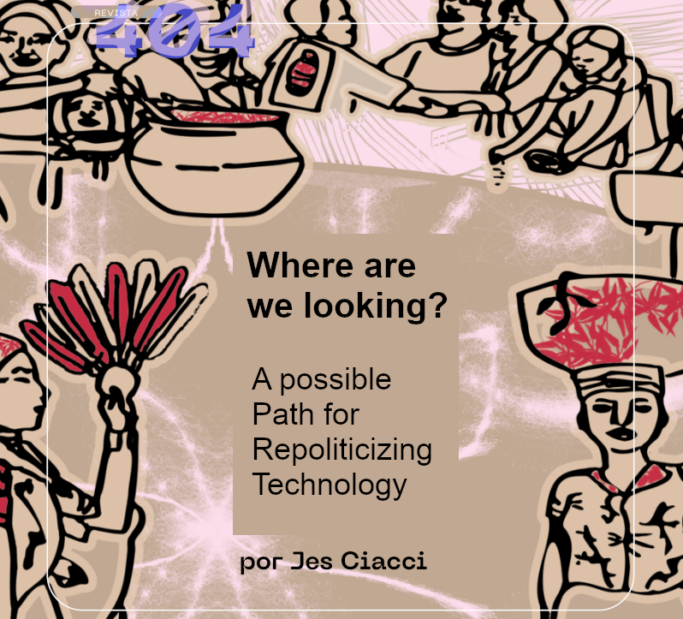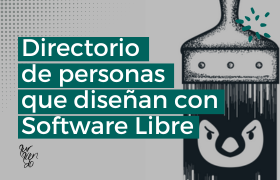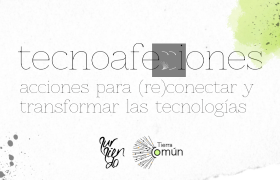Where are we looking?
A possible Path for Repoliticizing Technology

By: Jes Ciacci
Translation: Jamie McClelland
Originally published in Spanish
Where do digital technologies and politics intersect, specifically for those of us who value living collectively?
At this point in digital life, you will have come across more than once a sentence referring to the fact that technologies are not neutral, but respond to social, political and economic factors that are not made explicit. But… they don’t seem to be, do they? Or at least, knowing this is not enough for us to take action and move toward a vision of the world that does not resemble the vision of the technologies we use. We recognize that a handful of corporations codify our illusions, control what we see and impose the platforms on which we work, but we don’t see options beyond that. Where are we looking? How willing are we to relearn and reconnect with the digital technologies we use on a daily basis? What would we do it for?
The Tecnoafecciones project put it this way:
A few months ago I read in the strategic plan of an organization dedicated to the defense of digital rights:
Naming it from this perspective brings us closer to reviewing each of the dimensions where we could act. That is why implementing strategic plans that contain these worldviews enables lines of action to re-politicize technologies on our own terms. That is why Tecnoafecciones «is aimed at people who have the opportunity to rethink their affective relationship with technologies: the ways of doing, the links they enable or disable, the close and distant impacts» (Jes Ciacci and Paola Ricaurte, 2024) and proposes some initial possible actions to implement from the personal, community, state and global levels.
Consider the case of the massive outflow of users from ex-Twitter after its last acquisition and its new changes in content moderation policies. In November 2022 it was documented that «after Musk’s purchase, a 500% increase in racial slurs was seen, according to Network Contagion Research Institute» (AN / MSD Newsroom, 2022).
But do all technologies allow us to be repoliticized on our own terms? Clearly corporate technologies do not enable the same possibilities as free, community or democratic technologies.
Towards the end of 2023, Sursiendo started a series of conversations to name and characterize «the people behind the technologies we want.» In these interviews we present and ask: what are the desires, intentions and hopes of the people and collective projects that develop and maintain digital technologies from a perspective of social justice in the broadest sense. «If you had to give a personality to the program, application or infrastructure you [develop], what would you [say] it is like? [What] is the path by [which] you come to a project like this? What motivates you to continue to be a part of it?»
It is possible to read, in the voices of the people who write or maintain these technologies, what are the ideas of the world they are trying to uphold and support in developing technologies based on movement values. For example, María Álvarez Malvido directs us to it and pushes us a little further:
Other experiences that are close to me at the moment of putting technology into practice in «people’s hands» are the actions built by May First, a technology membership cooperative with more than 700 individual and organizational members. The cooperative promotes democratic decision-making processes about the technology infrastructure we inhabit. Some decisions are linked to the infrastructure itself and others to the political direction that the organization should take.
In the article «Politics and Practices of an Autonomous Technology: Voices from the May First Membership» we asked, «What would it mean to create, build, maintain technologies that listen to those who use them? What would it mean to maintain an infrastructure for political movements deeply connected to their communities and social justice?» It captures the voices of about twenty May First members who share the political implications of technology being part of the cooperative.
And so, how to design technologies in a consensual way, in support of people and the planet? May First is testing ways to enable participation and action. In addition to two permanent working groups (one focused on projects to improve the use and maintenance of the digital infrastructure, while the other is focused on advancing the organization’s political campaigns), the cooperative has a 26-member Board of Directors, democratically elected in an annual vote by the members, who also vote each year on the priorities on which to focus the work of the following period.
The political actions of the organization are also woven together with other networks and spaces in which May First participates, as well as with periodic seminars and discussions, where we reflect onthe intersection between digital technologies and the social processes we sustain. For example, there was a webinar called «Get The Tech off My Body,» focused on recognizing the implications of the use of digital technologies after the annulment of Roe v. Wade in the United States and the consequent restriction of access to abortion as a strategy of bodily repression. There was also the webinar «The Impact of Artificial Intelligence on Social Movements,» where we dialogued with researcher Paola Ricaurte on a vision of artificial intelligence that articulates the macro and micro-political aspects of technological development, as part of a decolonial and feminist project.
There is one more example that shows the links between mainstream technologies and the enormous distance they have with the social justice actions that many May First members support. The No Tech for Apartheid campaign denounced, as early as 2021, Amazon and Google for doing business with the Israeli government, thus supporting apartheid and genocide in Gaza. Nimbus, moreover, is a Google project providing cloud and artificial intelligence services to the Israeli government, against which some employees of the tech giant itself staged protests; a report was cited revealing that Google has created specific tools for that state’s Ministry of Defense. In response, Google fired 50 workers with a clear message about the importance it attaches to these contracts.
A little over a month before these events, May first Movement Technology was able to declare itself an Apartheid Free Zone (AFS), «committing to respect the principles built by Palestinian society through the Boycott, Divestment and Sanctions (BDS) movement.» The path that enabled this action was the result of a truly bottom-up approach. The Technology Infrastructure and Services (TIAS) team called on the entire membership to declare the organization an Apartheid Free Zone. Upon approval, it was ratified by the Board of Directors and shared as part of our action policies, which extends the commitment to «include the boycott of Amazon and Google products and services, along with encouraging their disuse and promoting their alternatives among the May First membership and our movements.»
We recognize the challenges that these actions entail both personally and collectively. We also consider, quoting Paola Ricaurte in our recent conversation, that:
People all over the world are resisting, at great cost and in different ways. There are amazing examples everywhere, every day, of people putting their energy into sustaining life.
For those of us who recognize the socio-technical processes implicit in the technologies we inhabit and make those spaces also places of bonding, affection and resistance, it is essential to do so from technologies that bet on the reproduction of life. We will do it little by little, yes, because they inspire us from the mountains of the Mexican Southeast: «We walk slowly because we go far.«
@sursiendo




